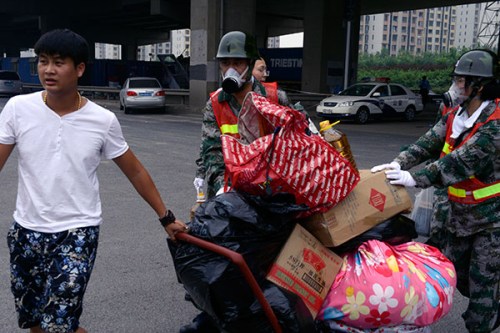
Residents that lived near the Tianjin Port blast site were forced to leave their homes because of toxic fumes. (Jia Guorong/For China Daily)
Why were the warehouses located so close to residential areas?
Again, this is a difficult question to answer. Yang Baojun, vice-president of the China Academy of Urban Planning and Design in Beijing, has called for the planning process to be overhauled.
"Because of economic development, the fast pace of urbanization and rising land prices in higher-tier cities, local governments need to pay greater attention to the distance separating residential areas from dangerous manufacturing and energy facilities," Yang said. "These should include chemical plants, power stations and paper mills."
Existing laws in China state that warehouses containing toxic materials must be at least 1,000 meters from major transport hubs and public buildings. But the Rui Hai International complex was only 560 meters away from a residential area and 630 meters from the railway station.
"It is impossible to improve production technology and storehouse methods over a night," Yang said. "But governments at different levels should be able to produce an urban plan that safeguards people's homes from potential harmful plants."
In Germany, industrial facilities, or warehouses, that use toxic or store chemicals, are built in isolated areas to protect the general public. The Berlin government also stipulates that these facilities have detailed safety and rescue plans in place. Plants are constantly monitored and regular safety checks are carried out.
How can disasters such as the Tianjin port explosion be averted in the future ?
Views on this subject are mixed. He Liming, chairman of the China Federation of Logistics and Purchasing, an industry body in Beijing, has pointed to the financial costs involved.
Moving chemical plants and warehouses outside of cities could prove difficult unless companies are heavily compensated
"As many chemical plants are located in the cities where land prices in China's urban areas have surged, they will not easily relocate unless they are paid the full value for the land they occupy," He said.
In addition, local governments rely on these companies to generate jobs, growth and taxes. In fact, they have become vital to domestic economies across the country.
Still, the Tianjin port explosion has to be a wake-up call for the entire nation, according to Zhang Boju, director of Friends of Nature in Beijing, a leading nonprofit organization involved in conservation protection.
Zhang would like to see all chemical-related industries reviewed and supervised by government and public watchdogs after calling for more transparency in the sector.
He pointed to public opposition surrounding the expansion of China National Petroleum Corp's refinery in Anning city, Southwest China's Yunnan province, in March.
Public concerns have been voiced regarding safety and environmental issues.
The plant refines 10 million metric tons of oil a year. It also produces paraxylene, which is used to purified terephthalic acid, a key component in the production of plastic bottles.
"As chemical plants are likely to raise fears among residents living in close proximity, the government must adopt a more active role in releasing well-timed information," Zhang said. "The plants' owner should share information about development plans and issue environmental reports."
"To further prevent risks, the public should be allowed to take an active and constructive role in safety and environmental issues," he added.
After the Tianjin blast, the State Council issued an emergency notice in which it asked governments at all levels to reinforce the safety management on dangerous chemicals and explosives.
It called for strict controls and the implementation of special regulatory measures on highly toxic chemicals such as cyanide, as well as inflammable and explosive materials. The State Council urged governments at all levels to learn the bitter lessons from the massive blast and to crack down on illegal activities to ensure the safety of the general public.


















































